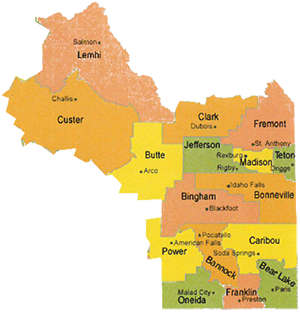A Guide to Juvenile Theft in Idaho & Possible Punishments
Shoplifting may not seem like the worst crime for teenagers to commit, but theft can cause a lot of harm in the long run. Retailers lose money, teenagers may seek out the thrill of stealing, and crimes could become worse. Every state has different laws as it pertains to shoplifting, including Idaho.
Follow this complete guide to learn about Idaho state shoplifting laws, how teens could end up in a juvenile detention center, and ways parents could also be held liable for the crimes.
Petit Theft & Grand Theft
The type of shoplifting crime a teenager is charged for is typically based on the value of the item. In Idaho, the two main crimes are broken down into petit theft and grand theft. Petit theft includes items valued less than $1,000 and is labeled as a misdemeanor. Grand theft includes items valued over $1,000 and is considered a felony.
For example, a teenager who steals a pack of gum or a video game console valued at $500 will be charged with petit theft. Petit theft has a maximum sentence of 90 days in a juvenile detention center. A defense lawyer can help argue lower punishments for lower values, but the duration is typically chosen by the judge.
A grand theft charge expands the punishment for juveniles to 180 days. In most cases, you probably won't get the maximum sentencing, but the length of a sentence could increase for repeat offenders.
In most cases, a teenager will be charged with the total amount of item value. The item value is typically the retail value of an item and does not include any sales, discounts, or promotions. The items are added together to create a total amount for the charge. For example, a bike worth $300 and a computer worth $800 could add up to $1,100 and result in a grand theft charge.
Willful Concealment
Idaho has a clear-cut willful concealment law in place that means a teenager doesn't need to leave the store to get charged with willful concealment. If an employee stops a person who has items hidden under clothes, in pockets, or in a backpack, then they could be charged with willful concealment.
The laws are in place to enforce anti-theft practices without the person actually needing to leave the store. Willful concealment will typically fall under the petit theft category and is considered a misdemeanor. When planning a defense for the case, security footage in the store can showcase a teen's actions and help prove innocence.
The actions and reactions of the minor will all impact how the case plays out in court.
Burglary
Besides grand theft, one of the other felony charges a teen may face for shoplifting is burglary. Burglary is different than shoplifting crimes because the law specifies that the juvenile entered the location with the intent to steal. The value of the stolen items does not matter in the case of a burglary. A blanket charge covers all types of theft.
A burglary typically includes extra steps. For example, if a teen enters a business when it is closed or wears a mask or conceals themselves in some way, they may be charged with burglary. A repeat offender could have strategic plans or further proof of a planned robbery. Like grand theft, a teenager could face up to 180 days in a detention center if they are charged with burglary.
Aiding & Abetting
A teenager doesn't have to physically hold items to get charged for the crimes. If a teenager assists someone in any way, then they could get charged with aiding and abetting. The teenager could simply be with the person and aware of the stealing. The teenager could be a lookout or try to distract employees from witnessing the theft.
No matter how the crime goes down, the aiding and abetting process is not a lesser charge. If the person who physically stole the items is charged with grand theft, then so is the teen who aided or abetted the crime. The punishment is the same as well, so a teenager does not get away with anything even if they did not touch the merchandise.
In some cases, teenagers could be unaware of a friend or family member committing the crime. This is where a criminal defense attorney comes in handy. Witness statements and evidence could help dismiss any aiding and abetting charges. Attending shoplifting classes and courses could also help dismiss charges as well.
Parental Liability
Not only could a teen get sentenced to a juvenile detention center, but the parents could be held liable for their actions. While parents will not face any charges or jail time, they will face the financial burden of the crime. According to Idaho state law, a parent could be held liable for the full amount of the items, plus damages between $100 and $250 dollars.
This means that a parent could have to pay $500 for a stolen video game console, plus another $250 in damages to the business for a total of $750.
If your teen has been involved in any type of shoplifting crime, contact our professional lawyers at Hart Law Offices, PC. We work hard to reduce sentences and help your teen in the stressful court of law.




















